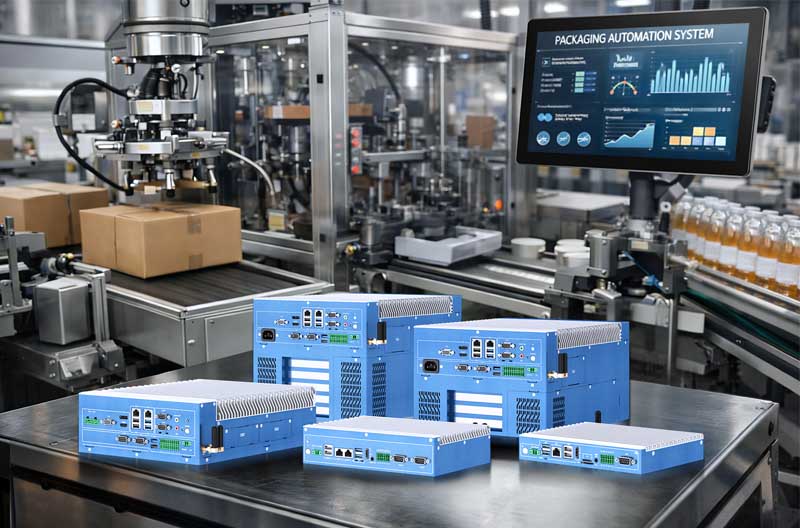Introduction
In today’s era of smart manufacturing, packaging automation plays a crucial role in improving efficiency, reducing waste, and ensuring consistent product quality. At the heart of every automated packaging system lies the industrial PC (IPC) — a powerful, reliable computing solution designed to operate seamlessly in demanding industrial environments. Industrial PCs for packaging automation are essential for managing control, monitoring, data processing, and communication tasks in modern packaging lines.
What Is an Industrial PC in Packaging Automation?
An industrial PC (IPC) is a ruggedized computing device designed for use in industrial environments such as packaging lines, assembly systems, and production plants. Unlike commercial computers, industrial PCs are built to withstand vibration, dust, humidity, and temperature fluctuations while maintaining stable operation 24/7.
In packaging automation, IPCs serve as the central control and data processing units for systems such as:
- Filling and sealing machines
- Labeling and inspection systems
- Cartoning and palletizing equipment
- Weighing, counting, and sorting stations
These systems rely on IPCs to ensure precise motion control, real-time monitoring, and reliable human-machine interaction.
Key Features of Industrial PCs for Packaging Automation
Industrial PCs used in packaging automation integrate advanced technologies to ensure consistent and high-performance operation. Some of the most important features include:
1. Rugged and Reliable Design
Built with industrial-grade materials, these PCs can endure the harsh conditions of packaging lines — including dust, vibration, and temperature variations — ensuring long-term durability and minimal downtime.
2. Fanless Cooling System
Many industrial PCs feature a fanless design, which minimizes maintenance and prevents dust ingress, keeping the system running smoothly for extended periods.
3. High Computing Performance
Equipped with Intel® Core™, Celeron®, or Alder Lake-N processors, industrial PCs deliver exceptional processing power for motion control, vision inspection, and data analytics.
4. Flexible Mounting Options
Industrial PCs can be configured for panel mount, wall mount, VESA mount, or rack mount installation, making them adaptable to various packaging machines and factory layouts.
5. Wide Connectivity and Expandability
Support for multiple I/O interfaces, such as USB, RS232, RS485, Ethernet, and PCIe expansion, allows integration with sensors, cameras, PLCs, and other automation devices.
6. Customizable for Application Needs
Manufacturers can customize display sizes, brightness levels, touch types (resistive or capacitive), and environmental resistance to meet specific packaging line requirements.
Applications of Industrial PCs in Smart Packaging Systems
Industrial PCs play a key role in enabling smart packaging automation, supporting real-time control, data visualization, and predictive maintenance. Common applications include:
Machine Vision Inspection – Ensuring product consistency and quality using AI-based image recognition.
Data Collection and Monitoring – Recording production metrics for traceability and performance optimization.
Motion Control and Synchronization – Coordinating multiple packaging devices for precise timing and smooth operation.
HMI (Human-Machine Interface) – Providing operators with an intuitive interface for control, diagnostics, and system feedback.
Edge Computing in Packaging Lines – Processing data locally to improve response speed and reduce network dependency.
Benefits of Using Industrial PCs for Packaging Automation
Implementing industrial PCs in packaging automation offers numerous operational and business advantages:
Improved Efficiency and Productivity
Real-time monitoring and control ensure smooth, coordinated processes with minimal downtime.
Enhanced Flexibility
Easily programmable to support different packaging types, product formats, and labeling requirements.
Lower Maintenance Costs
Fanless, solid-state designs and industrial-grade components reduce maintenance and repair needs.
Reliable 24/7 Operation
Designed for continuous use, ensuring stability even in high-volume production environments.
Support for Industry 4.0 Integration
Seamlessly connects with MES, SCADA, and ERP systems, enabling data-driven manufacturing and predictive maintenance.
Conclusion
As packaging operations move toward smart and connected manufacturing, industrial PCs have become indispensable for automation, control, and optimization. With their rugged design, strong performance, and flexible integration capabilities, industrial PCs provide the reliable control solutions required for modern packaging systems.
Whether for small-scale packaging lines or fully automated smart factories, investing in high-quality industrial PCs for packaging automation ensures long-term performance, scalability, and competitiveness in today’s fast-evolving manufacturing landscape.









